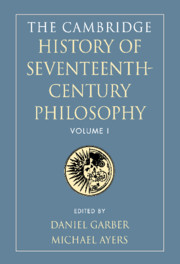Book contents
- Frontmatter
- Introduction
- I The context of seventeenth-century philosophy
- 1 The institutional setting
- 2 The intellectual setting
- 3 European philosophical responses to non-European culture: China
- II Logic, language, and abstract objects
- III God
- IV Body and the physical world
- V Spirit
- Bibliographical appendix
- Bibliography
- References
1 - The institutional setting
from I - The context of seventeenth-century philosophy
Published online by Cambridge University Press: 28 March 2008
- Frontmatter
- Introduction
- I The context of seventeenth-century philosophy
- 1 The institutional setting
- 2 The intellectual setting
- 3 European philosophical responses to non-European culture: China
- II Logic, language, and abstract objects
- III God
- IV Body and the physical world
- V Spirit
- Bibliographical appendix
- Bibliography
- References
Summary
In 1600 the population of Western Europe (that is, Europe West of the Elbe) was about 60 million; by 1750 it had become somewhat more than 75 million. So the continent which the philosophers of the seventeenth century inhabited had a population approximately the same as that of the islands of Britain and Ireland today; England, to pursue this parallel, had a population the same as that of the modern Republic of Ireland, about 4 million. The most populous country was France, with about 19 million inhabitants, though the states of Italy contained between them scarcely fewer people. The states of Germany held about 12 million; Spain, about 7 million; and the Netherlands (modern Holland and Belgium), about 3 million. The densest population was in the two great urbanised areas at each side of the continent, Italy and the Netherlands. They were also still the economic centres of Europe, though by the end of the century the growth of extra-European commerce had tilted the balance more towards the Atlantic and left Italy relatively worse off. The wealth of these two areas was matched by their cultural predominance: the history of the fine arts in early modern Europe could be told almost entirely in terms of the artists who worked in Italy and the Netherlands. This is less true of philosophy, but one is constantly made aware of the extent to which philosophers working outside these historic centres of European culture (other than in Paris) thought of themselves as somewhat provincial.
- Type
- Chapter
- Information
- Publisher: Cambridge University PressPrint publication year: 2000
References
- 1
- Cited by



